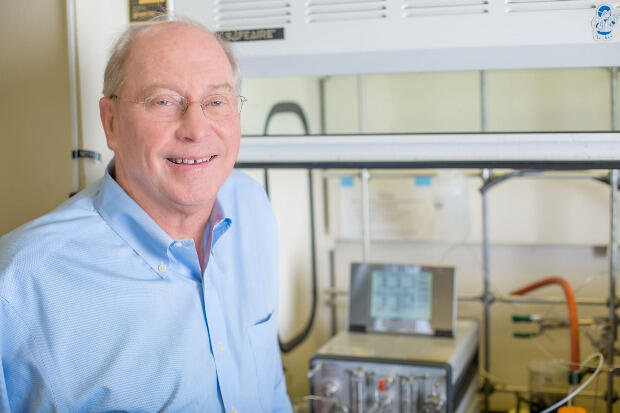
June 23, 2014
Virginia Commonwealth University leads research effort to improve access to AIDS drugs
Share this story
A $4.4 million grant from the Bill & Melinda Gates Foundation is giving Virginia Commonwealth University School of Engineering and collaborating research universities an opportunity to supply developing countries with affordable access to AIDS drugs.
B. Frank Gupton, Ph.D., VCU School of Engineering research professor and chair of the Department of Chemical and Life Science Engineering, is leading an interdisciplinary team that will focus on cost improvements for the drug nevirapine. The World Health Organization considers nevirapine a first-line therapy for the treatment of AIDS.
Gupton and other researchers from VCU School of Engineering have organized a partnership with several higher education institutions. This collaboration, known as the Medicine for All Initiative, includes specialists from the University of Washington, Florida State University and Massachusetts Institute of Technology.
Due to his extensive experience in pharmaceutical process development, Gupton will serve as principal investigator for the entire effort. The Gates Foundation has devoted over $4 million to the project in order to employ new synthetic and manufacturing methods. This will provide necessary health care to those in need.
The mission is to provide a dramatic change in pharmaceutical manufacturing technology while increasing access to lifesaving medicines worldwide.
“The team holistically applies the principles of modern synthetic chemistry, advanced analytical methodologies and next-generation processes in order to reduce the cost of drugs that have strategic importance to global health care,” said Gupton.
“The objective of this effort is to identify a manufacturing route leading to nevirapine that utilizes the lowest cost raw materials and ultra-efficient manufacturing tools," continued Gupton. "We anticipate this approach will not only lead to a new API (active pharmaceutical ingredients) manufacturing process paradigm that will reduce the cost of nevirapine, but may also be applied to other important drug targets, as well."
Tyler McQuade, Ph.D., is a Florida State University chemistry professor and Gupton’s colleague. Their shared interest in pharmaceutical manufacturing led to the founding of the Medicine for All Initiative. McQuade, his team at FSU and the MIT lab researchers are testing synthetic strategies for more affordable ways to manufacture active pharmaceutical ingredients.
“Remember, most of the World Health Organization recommended therapies are purchased by aid groups and then distributed in Africa and other places where it's difficult to get treatment,” McQuade said. “If you can continue to knock the price down further, that would mean public health groups that distribute drugs would be able to significantly increase their allotments for the year.”
The team at the University of Washington is working on process and quality control factors for continuous flow reactors to ensure manufacturing control for nevirapine.
“The application of continuous flow reactor technology is expected to both improve product quality and reduce cost,” noted Gupton. Continuous flow reactors streamline the process and help eliminate waste. “People don't realize how big of an issue AIDS is. It's growing by 14 percent globally a year and 30 percent of all childbearing women in South Africa have AIDS…. We have a lot of really bright young scientists and engineers working on this team and I am very optimistic of meaningful improvements in this area. This project could continue for a number of years. We feel like this is just the beginning.”
For now, Virginia Commonwealth University, University of Washington, Florida State University and Massachusetts Institute of Technology are focusing on developing improvements for the production of nevirapine through collaboration with the Gates Foundation, as well as the Clinton Foundation.
Subscribe to VCU News
Subscribe to VCU News at newsletter.vcu.edu and receive a selection of stories, videos, photos, news clips and event listings in your inbox.







